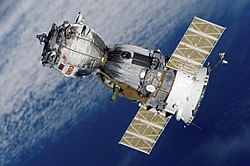 Irkut approaches the ISS | |
| Names | ISS 62S |
|---|---|
| Mission type | ISS crew transport |
| Operator | Roscosmos |
| COSPAR ID | 2020-023A |
| SATCAT no. | 45476 |
| Mission duration | 195 days, 18 hours and 49 minutes |
| Spacecraft properties | |
| Spacecraft | Soyuz MS-16 No. 745 [1] [2] |
| Spacecraft type | Soyuz MS |
| Manufacturer | Energia |
| Launch mass | 7,280 kg (16,050 lb) |
| Crew | |
| Crew size | 3 |
| Members | |
| Callsign | Irkut |
| Expedition | Expedition 62/63 |
| Start of mission | |
| Launch date | 9 April 2020, 08:05:06 UTC [3] |
| Rocket | Soyuz-2.1a No. B15000-042 [1] |
| Launch site | Baikonur, Site 31/6 |
| Contractor | RKTs Progress |
| End of mission | |
| Landing date | 22 October 2020, 02:54:12 UTC [4] |
| Landing site | Kazakh Steppe, 150 km (93 mi) southeast of Zhezkazgan |
| Orbital parameters | |
| Reference system | Geocentric orbit |
| Regime | Low Earth orbit |
| Inclination | 51.66° |
| Docking with ISS | |
| Docking port | Poisk zenith |
| Docking date | 9 April 2020, 14:13:18 UTC [5] |
| Undocking date | 21 October 2020, 23:31:41 UTC [5] |
| Time docked | 195 days, 9 hours and 18 minutes |
 Mission patch  From left: Cassidy, Ivanishin and Vagner | |
Soyuz MS-16 was a Soyuz spaceflight launched on 9 April 2020, [3] which transported three members of the Expedition 62/63 crew to the International Space Station. [6]
Contents
This flight was the first crewed launch using the Soyuz 2.1a launch vehicle, and the first crewed Russian mission not to launch from Gagarin's Start since Soyuz MS-02 in 2016. [7]

